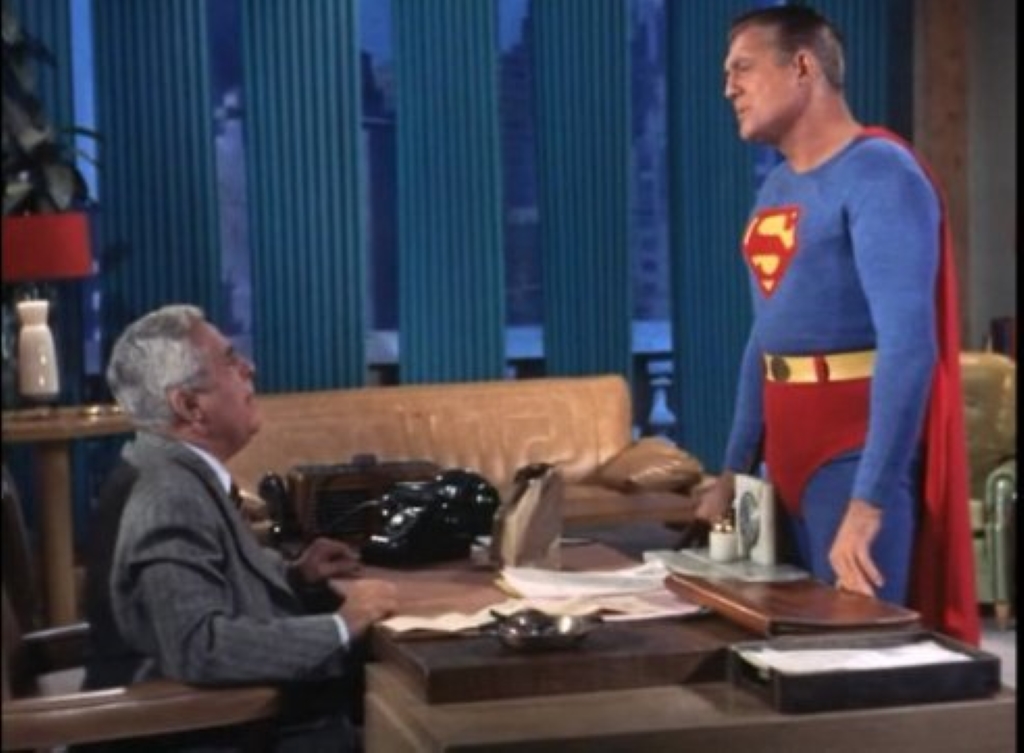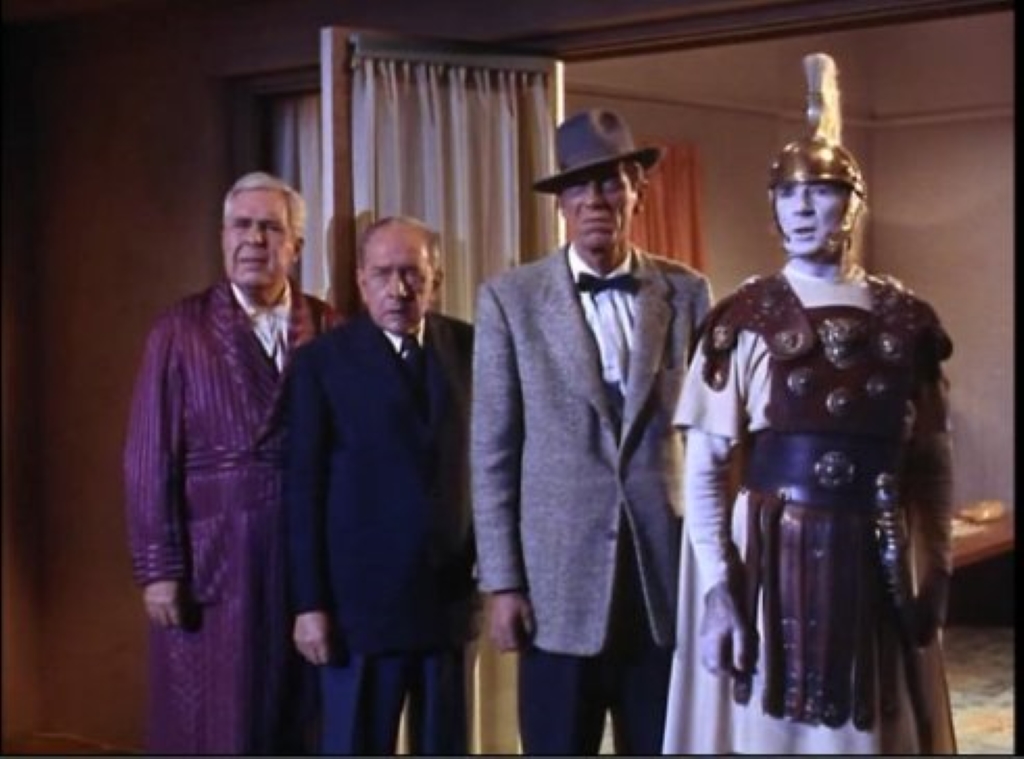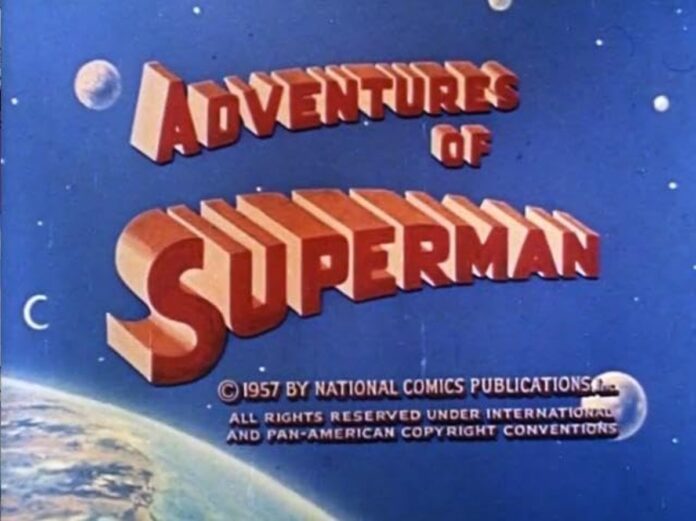The Adventures of Superman
Season 3, Episode 5: ‘Great Caesar’s Ghost’
Original airdate: May 21, 1955
Sidant: Welcome to our latest roundtable review series! In the upcoming two months, we will be dedicating our time to a group of characters that have come to dominate the summer cinema: Superheroes.
While superheroes are a major force in film, their presence on television has experienced sporadic success, with only a few series striking a balance between longevity and quality.
Our goal is to shed light on some of the reasons for these struggles and also to celebrate those episodes where television successfully captures the essence of superheroes.
I selected the episodes for this theme, and I believe “Great Caesar’s Ghost” exemplifies my rationale.
One consistent challenge in superhero television is the limited budget, which often restricts the development of action-packed, visually stunning set pieces that thrive in films.
Consequently, these stories tend to focus on the intricate balancing act between the heroes’ superhuman and everyday lives.
Furthermore, as demonstrated in this episode of The Adventures of Superman, series often rely on their supporting casts to infuse stories with life and divert attention from the scarcity of action.

“Great Caesar’s Ghost” boasts a rather absurd premise. One can envision the weary, overworked writers in 1955 brainstorming:
Well, Perry White always exclaims ‘Great Caesar’s Ghost,’ right? What if…bear with me here…he actually encounters Caesar’s Ghost? Wouldn’t that be fantastic?
(I’ve tried to capture the vernacular of the 1950s in my writing.)
And so, they created that particular episode. While it doesn’t entirely skimp on Superman, allowing us to witness him flying (quite majestically), shutting the door of an aircraft mid-flight, and “utilizing” his “x-ray vision” (though it’s best not to dwell on the abysmal special effects), he certainly isn’t the central character here, at least in theory.
However, in practice? Ouch. The most glaring issue lies in the episode’s storytelling and pacing.
The concept itself is weak, but “Great Caesar’s Ghost” exacerbates its problems by not venturing much beyond its foolish premise.
I must emphasize that my calculation isn’t exact, but I estimate that roughly 120 percent of this episode is devoted to Perry White repeatedly shouting some variation of “DID YOU SEE IT?”
Certainly, there are superior episodes in this series, those that offer George Reeves more substantial opportunities than entering scenes from the rear of sets in costume (I particularly adore how Superman gracefully enters rooms through windows here) and those that employ more innovative strategies to circumvent the limitations of the era.
Nevertheless, what sets “Great Caesar’s Ghost” apart is that nearly every superhero show includes similar episodes.
With extended airtime on television, even a half-season, there’s more room for character development and plot diversions than in a film series.
When world-threatening situations can’t occur at every commercial break, and an extensive display of superpowers isn’t feasible, you can at least expand the ensemble cast and give other characters a chance to shine.
Sometimes, however, it results in episodes like this one.
Astha: The most striking aspect of this episode, at first glance, is that it doesn’t truly function as a conventional superhero narrative.
Instead, it operates as a workplace drama set in a bustling city newsroom, with the unique twist that Superman is part of the staff.
The plot doesn’t revolve around Superman’s innate abilities; rather, it centers on how he responds to the situations that unfold around him.
He’s not engaged in a battle to save the world or vanquish nefarious adversaries.
Instead, his role is akin to that of a State Farm insurance agent dressed in blue spandex and sporting a pair of notably high-waisted red undergarments.
Nevertheless, the show does incorporate obligatory nods to Superman’s comic book origins, which I found quite enjoyable.
Rather than staging a dramatic revelation of his powers when Perry witnesses him bending steel pipes, the moment is downplayed because Perry is already grappling with his own visions, rendering this scene a minor reference to Superman’s superhuman strength rather than an exposé of his secret identity.

And when Perry delivers the line, “Who do you think you are, Superman?” it’s delivered in a humorous tone, serving as a necessary reminder that the show is titled “The Adventures of Superman” rather than “The Daily Planet Has a Superhero at the Copy Desk.”
This approach, which doesn’t revolve the entire show around Superman’s heroics, also prevents an over-reliance on his superhuman abilities.
For example, when he employs his X-Ray vision on the plane, it consists of George Reeves briefly scanning the room, and everyone’s reaction is essentially, “Yup, that looks like X-Ray vision!”
This reflects both the budget constraints and the sensibilities of the era. These creative choices essentially turn everyone at the Daily Planet into a somewhat glorified Scooby Gang, except they’re all employed.
As long as they eventually crack the mystery and save their beleaguered editor, who appears to be suffering from some form of brain damage during the first 21 minutes, the day is ultimately rescued.
(Two additional observations: One, Perry falls ill for a few days, and Clark Kent already has his name on the door for a job he “doesn’t even want”?
Truly, a commendable act on Superman’s part. And two, if I’m interpreting this correctly, Jarvis was part of the group that was tormenting his own boss all along?
How intricate was this con, and did it have anything to do with gambling debts? It seems like we’ve stumbled upon the real mystery here.)
Naveen: As a young child, I used to watch The Adventures of Superman quite regularly on Nick at Nite.
However, I realized that it plays quite differently to an adult audience. The pacing is notably slow, with scenes featuring Perry White incessantly asking, “Who’s there?
Who’s talking to me?” feeling particularly protracted. Most of the acting comes across as rather stiff, and, as Astha mentioned, there’s a distinct absence of genuine superheroes.
That being said (and despite the minuscule budget), I still found it exciting to watch this episode.
I’m enough of a Superman enthusiast that I’m content spending time watching almost any rendition of the character.
However, there’s something unique about George Reeves’ portrayal as the “friendly big brother.”
He portrays both Superman and Clark in a nearly identical manner, which, to me, implies a more equal dynamic between them.
In this episode, when Clark is temporarily appointed editor, he casually mentions that Superman hasn’t been seen because “I’ve been so chained to my desk.”
This version of Superman is so committed to being Clark Kent that he’s willing to forego superhero duties in favor of editing articles for the Daily Planet.
It’s utterly ludicrous, but it’s also incredibly endearing. As Astha mentioned, he’s the Daily Planet’s very own superhero.
Naturally, this episode doesn’t revolve around Superman at its core.
It primarily focuses on Perry White, a character who isn’t particularly well-suited to carry an entire storyline.
Over at Marvel, J. Jonah Jameson gets the opportunity to play a variety of entertaining Spider-Man-hating roles, but Perry is essentially a standard grumpy editor.
One of the few truly memorable things about Perry is his habit of exclaiming “Great Caesar’s Ghost!” during his rants.
The creative team behind this episode seized on that catchphrase and expanded it, resulting in quite a peculiar episode.

The episode never provides a satisfactory explanation for how Morley’s gang managed to execute their plan, and Perry’s reactions aren’t exaggerated enough to make it particularly amusing.
Nevertheless, towards the end, Superman dons a trenchcoat and masquerades as a ghost, only to be shot by some gangsters.
This final twist is more intriguing than the majority of things that typically occur on television.
Reesav: Naveen and Astha, you’re both absolutely correct.
By today’s superhero standards, it lacks the expected superhero flair, and it’s a flimsy premise on which to base a 25-minute episode of anything, let alone one featuring a superhero associated with incredible powers and abilities—the very powers and abilities the show’s opening encourages us to remember.
I wouldn’t go as far as to say that I found the episode enjoyable (unlike you, Naveen, I don’t share the same level of enthusiasm for the character), but I somehow managed to overlook the issues it presented.
The episode feels like a relic from the Golden Age of superhero comics, and please forgive me for using that phrase, as I’m not particularly fond of it.
Superman comics from the 1940s and 1950s often didn’t involve a plethora of supervillains or threats to the world.
Instead, Superman frequently faced gangsters and elderly gentlemen in suits.
When I say “faced,” I mean he did exactly what Superman does in this episode: outwit them and use the bare minimum of his powers to achieve his goals.
Even the “friendly big brother” characterization that Naveen beautifully describes in George Reeves’s portrayal of Superman mirrors the comic book version from that era.
Therefore, while it might not be an exciting or groundbreaking episode of television, I can easily imagine it working as a solid 22-page comic book story during that time.
Read More: Roundtable Review: Alfred Hitchcock Presents, “Breakdown”


